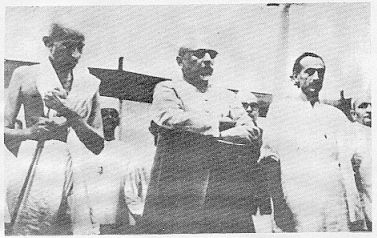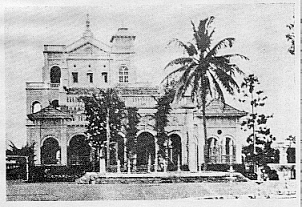| The "Quit India" resolution passed by the ALL-India
Congress Committee brought it into a head-on collision with the Government in August 1942.
The Viceroy, with the strong backing of the British Cabinet, struck hard. Gandhi, Nehru
and almost all the Congress leaders were imprisoned; the severest repression was launched
against the Congress—its funds were frozen offices sealed and publicity media
plugged. This "blitzkrieg" had violent repercussions. In the last speech before
the All-India Congress Committee before his arrest, Gandhi had made non-violence the basic
premise of the struggle which he proposed to launch; this advice remained unheeded between
the frenzy of the people and the hammerblows of the Government. In several parts of the
country, in Bihar, in U.P., in Bangal and in Bombay, the fury of the people burst the
dykes and turned on the instruments and symbols of British rule. "The Congress
Party", Churchill told the House of Commons, "has now abandoned the policy which
Mr. Gandhi had so long inculcated in theory and has come into the open as a revolutionary
movement." In India and abroad official propaganda attributed violence to a plot
carefully laid by Congress leaders. Gandhi was even accused of being pro-Axis, and
assisting a Japanese conquest of India. Official propaganda held the field for a time, but
not for long. "It is sheer nonsense," Smuts, Gandhi’s old antagonist in
South Africa, told a press conference in London in November 1942, "to talk of Mahatma
Gandhi as a fifth columnist. He is a great man. He is one of the great men of the
world."
Gandhi with Azad and Kripalani at the historic
"Quit India" meeting of
Mahadev Desai, who had served as Gandhi’s secretary for 25 years, died of a heart attack within a week of his imprisonment and Kasturba, the Mahatma’s wife, passed away in 1944 after a long illness. Early in 1944, his health began to cause concern to the Government. He had contracted malaria and had been running a high temperature. The tide of the war had already turned in favour off the Allies, and the risks of his release seemed to the Government immeasurably less than those of his possible death in jail. After his release in May 1944, Gandhi tried to break the political deadlock. Neither Churchill, who still headed the British Cabinet, nor Jinnah, who had the commanding voice in the counsels of the Muslim League, seemed eager for a political détente. The British seemed reluctant to part with power, and the Muslim League evidently was waiting for an opportunity for driving a harder bargain. A formula suggested by C. Rajagopalachari, which Gandhi discussed with Jinnah, conceded the substance of the Muslim League’s demand for Pakistan, but the offer was turned down by the League leader. |

